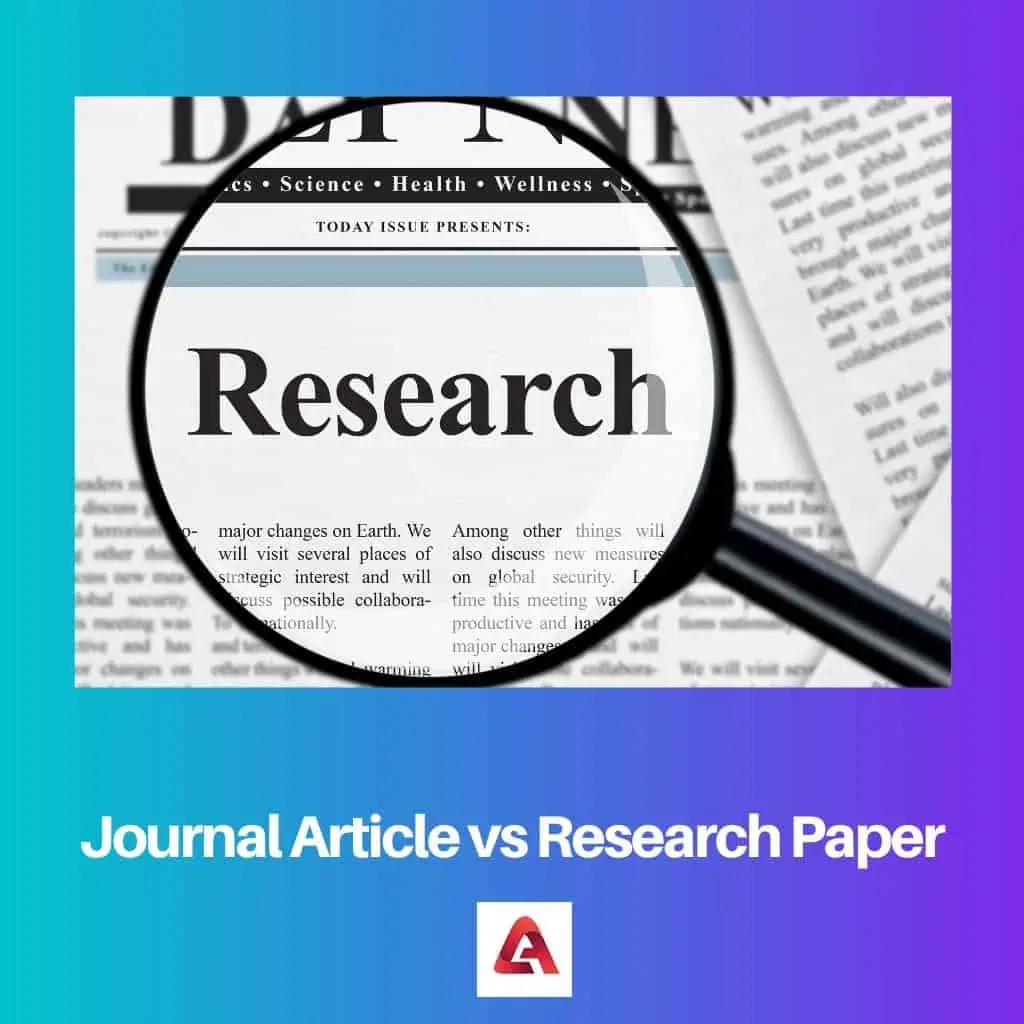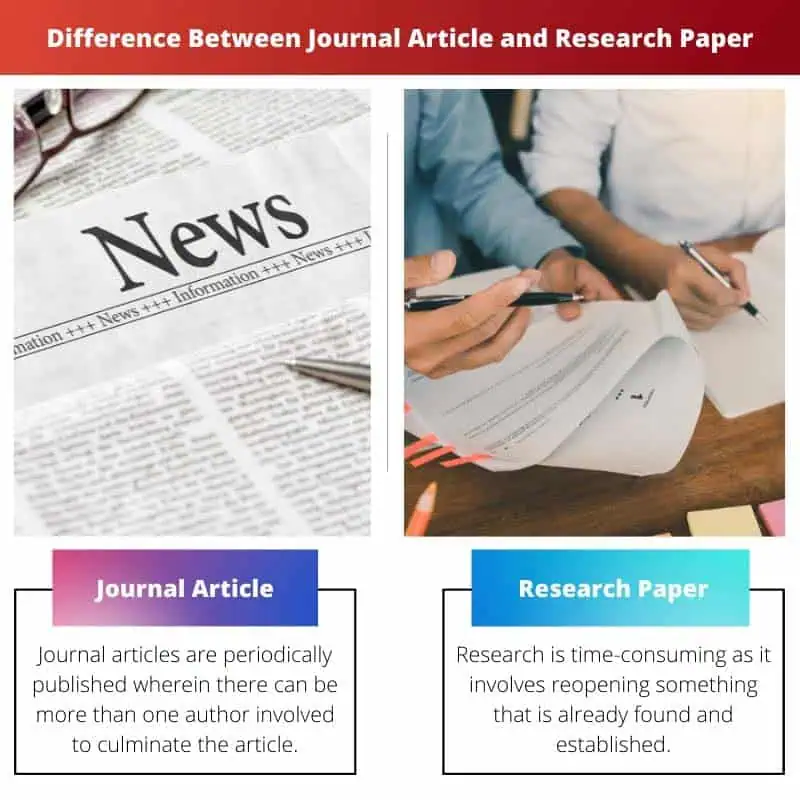
International Journal of Research (IJR)
IJR Journal is Multidisciplinary, high impact and indexed journal for research publication. IJR is a monthly journal for research publication.

DIFFERENCE BETWEEN RESEARCH PAPER AND JOURNAL ARTICLE
Difference between research paper and journal article.

Research Paper

Argumentative Research Paper
Analytical research paper, journal article, the differences, research paper:, journal article:.
- Share on Tumblr

- Already have a WordPress.com account? Log in now.
- Subscribe Subscribed
- Copy shortlink
- Report this content
- View post in Reader
- Manage subscriptions
- Collapse this bar
Difference Between Journal and Research Paper?
Home / Research papers / Difference Between Journal and Research Paper?

It is an absolute confusion and worry in some ways for a wannabe or a first-time researcher or a research scholar especially if you are still a student trying to work on a research project with your professor. Many of us get often confused when we hear the words research paper or a journal for the first time. The reason is that we have no or little idea what the words mean or we never looked into them even though we keep hearing them every once in a while. So, here are a few differences between a “ JOURNAL” and a “RESEARCH PAPER ” A Journal is collection of articles on various topics. There are various types of journals such as personal journal, academic journal , creative journals etc. But in terms of academic we need to learn more about an academic journal. It is book that comprises articles on different variety of topics. It is an anthology of different work collections. Unlike a research paper it consists of articles on various topics. It is often used as a reference to write a research paper. It is a periodical publication based various topics and contexts are related or co-related to each other. The information provided in a journal is not as deep as it is in a paper. As already said, a journal acts as a reference point to various individuals or organizations who are carrying out a research.
A research paper is basically a sheet of information on a specific topic. If we look at the standard definition it says, “It is a descriptive context in the form of words or text”. It provides detailed and relevant information on a specific topic to its readers. It is a study on a specific problem and it intends to provide a possible practical solution at the end of it. It is a team work of two or three individuals mostly. It can be up to 20 pages long or even more and it is an extensive study on one specific topic. Nevertheless, it should be understood that its length depends on the context of the study.
However, the key difference between a journal and a research paper is that a journal is limited to 5,000 – 10,000 words unlike a research paper. A journal can provide you with a list of national and international conferences as it is a periodical publication. It also provides you with conference alerts as it is a periodical publication like already said. Journal publication is a dream to many students and research scholars especially if it is their first ever research paper.
In conclusion, a journal is a collection of articles on a various academic related topics with limited words. Whereas a research paper is extensive and detailed study on a specific topic. If you are one of those wannabe research scholars looking to get your first journal publications then conference alerts here have a list of journals and their details waiting for you.
Related Posts

- Research article
Difference Between Research Article and Journal Article
As an academic researcher, publishing one’s work and contribute to the growing research, either by research articles or through journal articles, ...

- Research papers
How to Publish a Research Paper?
Publishing your research paper is an absolute honor for you as an author. It acknowledges the work you have done in your field. It’s an ...

- Conference in India
Upcoming Conferences in India 2024 with Journal Publication
Conferences in Tamil Nadu 2024 Conference Papers & Journal Papers, In Essence Conference papers refer to papers written for the purpose of ...

- International conferences
The 5 Important Reasons to Attend International Conference
While attending a conference is always a pleasure and considered an esteemed opportunity by students, research scholars, and academicians, many ...

- Fast publishing scopus indexed journals
Where can I Find Fast Publishing Scopus Indexed Journals?
Finding the right Scopus-indexed journal with a quick publication process becomes so difficult and sometimes confusing as well, owing to the fact ...

In the realm of academia, the publication of research papers serves as a gateway to recognition, knowledge dissemination, and professional ...

- Upcoming Conferences
Upcoming International Conferences with Journal Publication 2020-2021
Researchers often broadcast their research work and findings through conference proceedings, presentations, or publications. International ...

How to Find a Suitable Journal to Publish My Research Papers?
When it comes to finding the best possible journal for the publication of your research work, there are numerous factors that have to be paid ...

Which are the Best Journals to Publish My Research Papers in India?
The primary intention of every researcher or academic who wishes to have their research work, findings, and outcomes published in journal ...

Where can I Submit Research Paper for Publication in India and International Journal
The primary goal and aspiration of all academics, irrespective of the field or discipline they specialize in, is to gain prominence and ...

- Conference Alerts
How Conference Alert is playing a vital role in Scholar’s Life
Nowadays in this world, everyone needs to be updated with the technology to make the life smoother with innovation. The only way which leads to ...
Filter by Category
- Academic conferences
- Academic conferences 2024
- Academic journals
- Agricultural conference
- Agriculture conference
- AI Conference
- ai conferences
- artificial intelligence conference
- Australia conference
- Australia invitation letter
- Best cities for conference
- Biology Conference
- Business Conference in USA
- Business conference in USA with invitation letter
- Canada conference
- Canada conference invitation letter
- Canada invitation letter
- Christian Conferences
- Church Conference in USA
- Church Conferences
- Civil engineering conference
- clinical microbiology conference
- Conference 2021
- Conference Alert 2021
- Conference Alerts 2020
- Conference Alerts 2021
- Conference Alerts 2024
- Conference Benefits
- Conference in Canada
- Conference in Indonesia
- Conference in USA
- Conference invitation letter
- Conference planning checklist
- Conference planning tips
- Conference Topics
- Conferences
- Dental conference
- Dental conference 2024
- Dental conference india
- Dentistry conference
- e-conference visa India
- Engineering
- Engineering and technology conference
- Engineering conference
- Fully funded international conference
- India conference
- India conference 2024
- Indonesia conference 2024
- International academic conferences
- International and National conference
- International Church Conferences
- international conference
- International conference 2021
- International conference 2024
- International conference in india
- International conference in India 2021
- international conference on artificial intelligence
- International conference on engineering
- International conferences 2024
- International conferences in Indonesia 2024
- International medical conference
- International medical conferences 2024
- Invitation letter
- Journal article
- Journal publication
- Journal publication 2020
- Journal publication 2024
- Journal publication scopus
- Journal publication services
- Letter for invitation letter
- Lithuania conference
- Lithuania conference with invitation letter
- Medical conferences 2024
- microbiology conference
- molecular biology conferences
- Online conference
- Pharma conference
- Pharmaceutical conference
- Pharmacy conference
- Publish a research paper
- Research paper in India
- Research paper publication in India
- Research paper publishers
- Scopus indexed conference 2024
- Scopus Indexed Conferences
- Scopus indexed journals
- Scopus journals
- structural biology conference
- Top cities 2024
- Top cities for conference
- UK conference 2024
- UK invitation letter
- Upcoming conferences 2020
- Upcoming conferences 2024
- Upcoming dental conferences
- Upcoming engineering conferences
- Upcoming international conference
- Upcoming medial conferences 2024
- USA business conference
- USA Church Conference
- USA conference
- USA conference 2024
- USA conference visa
- USA invitation letter
- Video conference
- Virtual conference 2020
- Virtual conference 2021
- Virtual conferences

Subscribe Now
Add a comment, leave a reply cancel reply.
Copyright © 2024 Conference Alerts All Rights Reserved.
Journal Article vs Research Paper: Difference and Comparison
Sharing is caring!
A journal article presents original research findings in a concise format, focusing on a specific topic within a broader field. It undergoes peer review before publication, ensuring quality and validity. On the other hand, a research paper is a comprehensive document that may include multiple experiments, analyses, and discussions, aimed at contributing to the advancement of scientific knowledge.
Key Takeaways A journal article is a shorter scholarly writing published in a specific academic journal. A research paper is a more extended, comprehensive academic writing presenting original research. Journal articles are more focused and present specific findings, while research papers are broader and present a more comprehensive study.
Journal Article vs Research Paper
A journal article is a piece of published work that presents the research findings and may include analysis, remark, or discussion. A research paper is a detailed account of the research that may be published or unpublished and includes an introduction, literature review, methods, results, and conclusion.

Comparison Table
What is journal article.
A journal article is a scholarly publication that presents the findings of original research, analysis, or review within a particular academic field. These articles serve as fundamental units of scholarly communication, disseminating new knowledge, theories, and insights to the academic community and beyond. Here’s a detailed breakdown:

Content and Structure
1 Abstract: A journal article begins with an abstract, a concise summary of the study’s objectives, methods, results, and conclusions. The abstract provides readers with a quick overview of the article’s content and findings.
Similar Reads
- A Journal vs An Article: Difference and Comparison
- Wax Paper vs Baking Paper: Difference and Comparison
- Parchment Paper vs Wax Paper: Difference and Comparison
- Research Method vs Research Methodology: Difference and Comparison
- Marketing Research vs Market Research: Difference and Comparison
2 Introduction: Following the abstract, the introduction sets the context for the study by reviewing relevant literature, identifying gaps or controversies in existing knowledge, and stating the research objectives or hypotheses.
3 Methods: The methods section outlines the procedures, materials, and techniques used to conduct the study. It should provide sufficient detail to enable replication of the experiment or analysis by other researchers.
4 Results: This section presents the findings of the study, using tables, figures, or graphs to illustrate data. Authors describe the results objectively, without interpretation or speculation.
5 Discussion: In the discussion section, authors interpret the results in light of the study’s objectives and existing literature. They may address the implications of their findings, suggest future research directions, and discuss limitations or potential sources of bias.
6 Conclusion: The conclusion summarizes the main findings of the study and highlights their significance. It may also reiterate the study’s contribution to the field and offer final reflections or recommendations.
Peer Review Process:
1 Submission: Authors submit their articles to scholarly journals for publication consideration, adhering to the journal’s guidelines and formatting requirements.
2 Peer Review: Upon submission, the journal’s editor assigns the manuscript to peer reviewers—experts in the field—who evaluate the article’s quality, originality, methodology, and significance. Peer review helps ensure the rigor and credibility of the research.
3 Revision: Based on the reviewers’ feedback, authors may revise their article to address any concerns or criticisms raised. This iterative process of revision and reevaluation continues until the article meets the journal’s standards for publication.
4 Acceptance and Publication: If the article meets the journal’s criteria, it is accepted for publication and undergoes final editing and formatting. Once published, the article becomes part of the journal’s archive and is accessible to readers worldwide.

What is Research Paper?
A research paper is a comprehensive document that presents the findings, analysis, and interpretations of original research conducted by the author(s) within a specific academic discipline. These papers serve as a means for scholars to contribute new knowledge, theories, and insights to their respective fields. Here’s a detailed breakdown:
1. Content and Structure
1 Introduction: The introduction of a research paper provides background information on the topic, reviews relevant literature, and outlines the research objectives or hypotheses. It establishes the context for the study and justifies its significance.
2 Methods: The methods section describes the procedures, materials, and techniques employed in the research. It should provide sufficient detail to enable other researchers to replicate the study and verify its results.
3 Results: This section presents the empirical findings of the research, using tables, figures, or graphs to illustrate data. Authors report their observations or measurements objectively, without interpretation or speculation.
4 Discussion: In the discussion section, authors interpret the results in light of the research questions or hypotheses, comparing them to previous studies and addressing their implications. They may also explore alternative explanations, limitations of the study, and avenues for future research.
5 Conclusion: The conclusion summarizes the main findings of the research and highlights their significance. It may reiterate the study’s contribution to the field, offer final reflections, and suggest directions for further inquiry.
Characteristics and Scope
1 Original Research: Unlike review papers or essays, research papers are based on original research conducted by the authors. They contribute new data, insights, or interpretations to the academic discourse.
2 Rigorous Methodology: Research papers adhere to rigorous scientific or scholarly methodologies, employing systematic approaches to data collection, analysis, and interpretation. They prioritize objectivity, validity, and reliability in their findings.
3 Length and Complexity: Research papers vary in length and complexity, depending on the scope of the study and the requirements of the target publication venue. They may range from concise reports of preliminary findings to comprehensive analyses of multi-year research projects.
4 Contribution to Knowledge: Research papers aim to advance knowledge within their respective fields by addressing research gaps, testing hypotheses, or generating new theories. They contribute to the cumulative growth of scholarship through the dissemination of original research findings.

Main Differences Between Journal Article and Research Paper
- Journal articles focus on a specific aspect or finding within a broader topic.
- Research papers provide a comprehensive analysis of a research project, including multiple experiments, analyses, and discussions.
- Journal articles are concise, containing essential findings, methods, and interpretations in a limited space.
- Research papers tend to be longer and more detailed, offering exhaustive exploration of the research topic, methodology, results, and implications.
- Journal articles undergo peer review by experts in the field before publication, ensuring quality and validity.
- Research papers may or may not undergo formal peer review, depending on the publication venue or academic requirements.
- Journal articles present findings objectively, without extensive interpretation or speculation.
- Research papers include in-depth interpretation of results, discussion of implications, and exploration of potential limitations or biases.
- Journal articles contribute to the scholarly conversation by presenting new findings, analyses, or reviews within a specific topic area.
- Research papers advance knowledge within a field by offering comprehensive analyses, testing hypotheses, or generating new theories through original research.

- https://gssrr.org/index.php/gssrr/How-to-Publish-Research-Paper
- https://www.springer.com/gp/authors-editors/journal-author/types-of-journal-manuscripts/1356
- https://owl.purdue.edu/owl/general_writing/common_writing_assignments/research_papers/index.html
I’ve put so much effort writing this blog post to provide value to you. It’ll be very helpful for me, if you consider sharing it on social media or with your friends/family. SHARING IS ♥️
Want to save this article for later? Click the heart in the bottom right corner to save to your own articles box!
By Emma Smith
Emma Smith holds an MA degree in English from Irvine Valley College. She has been a Journalist since 2002, writing articles on the English language, Sports, and Law. Read more about me on her bio page .
Related Post
Arithmetic progression vs arithmetic sequence: difference and comparison, arithmetic mean vs geometric sequence: difference and comparison, discipline vs punishment: difference and comparison, strategic vs operational control: difference and comparison, strict vs absolute liability: difference and comparison, supply vs quantity supplied: difference and comparison, uber vs uber eats: difference and comparison.
- SpringerLink shop
Types of journal articles
It is helpful to familiarise yourself with the different types of articles published by journals. Although it may appear there are a large number of types of articles published due to the wide variety of names they are published under, most articles published are one of the following types; Original Research, Review Articles, Short reports or Letters, Case Studies, Methodologies.
Original Research:
This is the most common type of journal manuscript used to publish full reports of data from research. It may be called an Original Article, Research Article, Research, or just Article, depending on the journal. The Original Research format is suitable for many different fields and different types of studies. It includes full Introduction, Methods, Results, and Discussion sections.
Short reports or Letters:
These papers communicate brief reports of data from original research that editors believe will be interesting to many researchers, and that will likely stimulate further research in the field. As they are relatively short the format is useful for scientists with results that are time sensitive (for example, those in highly competitive or quickly-changing disciplines). This format often has strict length limits, so some experimental details may not be published until the authors write a full Original Research manuscript. These papers are also sometimes called Brief communications .
Review Articles:
Review Articles provide a comprehensive summary of research on a certain topic, and a perspective on the state of the field and where it is heading. They are often written by leaders in a particular discipline after invitation from the editors of a journal. Reviews are often widely read (for example, by researchers looking for a full introduction to a field) and highly cited. Reviews commonly cite approximately 100 primary research articles.
TIP: If you would like to write a Review but have not been invited by a journal, be sure to check the journal website as some journals to not consider unsolicited Reviews. If the website does not mention whether Reviews are commissioned it is wise to send a pre-submission enquiry letter to the journal editor to propose your Review manuscript before you spend time writing it.
Case Studies:
These articles report specific instances of interesting phenomena. A goal of Case Studies is to make other researchers aware of the possibility that a specific phenomenon might occur. This type of study is often used in medicine to report the occurrence of previously unknown or emerging pathologies.
Methodologies or Methods
These articles present a new experimental method, test or procedure. The method described may either be completely new, or may offer a better version of an existing method. The article should describe a demonstrable advance on what is currently available.
Back │ Next
Journal vs conference papers: Key differences & advice
Journal and conference papers are not the same, and both formats have advantages and disadvantages. A good understanding of the key differences between journal and conference papers avoid s pitfalls, such as copyright issues when wanting to turn a conference into a journal paper at a later stage.
Disclosure: This post may contain affiliate links, which means I may earn a small commission if you make a purchase using the links below at no additional cost to you . I only recommend products or services that I truly believe can benefit my audience. As always, my opinions are my own.
What is a journal paper?
What is a conference paper, advantages of journal papers, disadvantages of journal papers, advantages of conference papers, disadvantages of conference papers, differences between journal and conference papers, questions to ask yourself before submitting a conference paper, is conference paper better than journal paper, can you use a conference paper in a journal, are all conference papers automatically published in conference proceedings, do conference papers count as publications.
A journal paper is a written piece of academic work – presenting empirical research, a theoretical discussion, or both – published in an academic journal. Most journal papers or articles are peer-reviewed , meaning they undergo a rigorous review process involving several stages and rounds of revisions before they are published.
Most academic journals have an impact factor, which is an index calculated based on the number of citations of articles published within a specific journal. The higher the impact factor of a journal, the wider the (potential) reach of journal papers that it publishes. And the better the reputation of the journal.
Therefore, authors of journal papers tend to target journals with a high impact factor to publish their work. There are other criteria that play a role when selecting a journal to publish research . However, the impact factor remains a crucial one, as publications in high-impact factor journals strongly influence academic promotions.
A conference paper is a piece of academic work that is specifically written for an academic conference, and mostly accompanies a conference presentation. While there are some exceptions, most conference papers are not peer-reviewed.
Conference papers are usually submitted several weeks before the actual conference, and circulated among conference participants in preparation for the actual presentations. However, not all conferences require conference papers. And some conferences make the submission of a conference paper optional.
Many conferences that require or allow the submission of a conference paper have ‘best conference paper’ awards, rewarding outstanding submissions. Furthermore, some conferences publish a collection of conference papers after the event, in the so-called conference proceedings. Many conference proceedings do not have an impact factor.

If you are looking to elevate your writing and editing skills, I highly recommend enrolling in the course “ Good with Words: Writing and Editing Specialization “, which is a 4 course series offered by the University of Michigan. This comprehensive program is conveniently available as an online course on Coursera, allowing you to learn at your own pace. Plus, upon successful completion, you’ll have the opportunity to earn a valuable certificate to showcase your newfound expertise!
Advantages and disadvantages of journal and conference papers
The choice between a journal or a conference paper should be a careful one. Both formats fulfill important but different roles in academia. Therefore, a good understanding of the benefits and drawbacks of both formats can help to make an informed decision.
Please notice that the following points are developed from a social sciences perspective. Other fields and specific disciplines may have different standards.
- Journal papers are more prestigious in academia. Especially if you strive for an academic career , publishing peer-reviewed journal papers in high-impact journals should be your priority.
- Journal papers are more frequently cited than conference papers. Journal impact factors are not the only metric that strongly influences academic promotions: The so-called h-index is a metric that measures your ‘impact’ in terms of how often your publications have been cited. And journal papers are cited more often than conference papers, as they are considered more reputable.
- Journal papers undergo revisions, which often means they are of higher quality. Due to the rigorous peer-review process that most journal papers are subjected to, the quality of journal papers tends to be better than that of conference papers. During peer review, experts on a topic point out flaws in the draft paper, challenge your thinking and provide suggestions for improvement. While dealing with peer review comments can be a tedious process, the final result is often a much better paper compared to the initial manuscript.
- Publishing a journal paper takes time. The whole process from manuscript to published paper can be lengthy, and take from anywhere between several months to several years.
- Most journals do not publish preliminary results. Even if you make a groundbreaking discovery in your preliminary analysis, most journals will not consider it worthy of a publication before more final conclusions can be drawn.
- There is a risk of outdated data in journal papers. For instance, if you want to publish your academic work to contribute to a current societal discussion, a journal paper may not be the best option. In the worst case, the publishing process takes more than a year and by the time of publication, your data may be outdated. Furthermore, your conclusions may be irrelevant for practice as a lot can change in a year.
- Journal papers have to follow strict rules set by journals. Journals set, for example, rules in terms of length, structure, or reference style that have to be followed. Conference papers, on the other hand, are often more flexible.
- Conference papers tend to have a lower threshold of acceptance than journal papers. It is much easier to publish a conference paper in conference proceedings than publish academic work in a high-impact journal. Therefore, conference papers can be a valuable option to learn about paper writing and publishing, and an easier way for early career researchers to get their name on a publication.
- Conference papers are published relatively fast. Some conference papers undergo peer review before being published in conference proceedings, but many don’t. In general, conference proceedings are published relatively soon after the actual conference takes places. Thus, a conference paper can be a good way to publish fast.
- Conference papers can discuss ongoing research and preliminary results. Contrary to journal papers, conference papers often address ongoing research and tentative conclusions. Furthermore, the format tends to be more open than in journal papers, providing authors of conference papers more freedom in terms of content and structure.
- Conference papers can often compete for ‘best conference paper’ aw ards . And having such an award to your name certainly looks good on your academic CV !
- Conference papers do not count as much as journal publications for career advancement. This is because many conference papers are not peer-reviewed and because many conference proceedings do not have an impact factor. Thus, in terms of career promotion or trajectories, conference papers are less relevant than journal papers.
- Conference papers can create copyright issues. It is a very common scenario: an author writes a conference paper first, then makes some edits and submits it to an academic journal for publication. If the conference paper has been published in conference proceedings, it will likely be flagged as plagiarised by the journal. Journals do not like to publish articles which have been published elsewhere in a similar fashion, and some use any indication of plagiarism (even if it is self-plagiarism) as a reason to desk-reject a manuscript.
- Sharing great ideas prematurely in a conference paper can make you vulnerable. Unfortunately, there is a lot of competition in academia, and not everyone plays by the rules. Therefore, you should always carefully consider how much of your work you share, without linking it to a publication of your own. Sharing an excellent idea that is sent around to hundreds of conference participants creates a risk that someone copies or steals your idea or approach, and tries to publish it faster in a journal article than you do.
Based on the discussion of the advantages and disadvantages of journal and conference papers above, the following key differences come to light:
- Content and requirements : Conference papers are more open to include preliminary results and are more flexible in terms of requirements than journal papers. The target audience of conference papers are conference participants, while journal papers target the wider academic community.
- Submission and peer review process : Journal papers tend to be submitted via an online system and undergo a structured peer review process. Conference papers are often simply sent to the conference organisers by email and are not peer-reviewed.
- Time to publication: Conference papers are often published more quickly in conference proceedings than journal papers are published in academic journals.
- Career relevance: Journal papers are much more relevant for academic careers than conference papers. Most journals have impact factors, while most conference proceedings do not have impact factors.
Even though journal papers are more important for academic promotions, submitting a conference paper is not per se the wrong choice. A ‘best conference paper’ award, for instance, can make you stand out when applying for academic jobs.
When embarking on writing a conference paper, it is better to be safe than sorry: At times, it may require reaching out to conference organisers or target journals to make sure that you will not run into copyright or plagiarism issues at a later point.
Oftentimes, conferences still allow you to present even without submitting a conference paper. Or you can ask the conference organisers not to include your paper in the conference proceedings. Furthermore, some journals are okay with publishing a paper that has been published in a conference proceeding earlier. Just make sure to ask in advance to prevent bad surprises!
Thus, when considering a conference paper, first answer the following questions:
- What are the benefits of submitting a conference paper to the specific conference, and do they outweigh the drawbacks?
- How can I mitigate the drawbacks? (Would my conference paper be published in the conference proceedings and can I opt out? Can I participate in the conference without a conference paper?)
- Do I share too many original ideas in my conference paper, which someone could copy without referring to my work as I haven’t published on the topic yet?
- Could I face copyright issues if I want to turn my conference paper into a journal paper at a later point?
Frequently Asked Questions
In academia, journal papers are considered ‘better’ than conference papers because they have a stronger positive impact on academic careers. Reasons for this are the more rigorous peer-review process that journal papers tend to undergo before publication, the higher standards of journals compared to conference proceedings, and the impact factor of journals.
You should never simply submit a conference paper to a journal without making substantial edits beforehand. That said, it is okay to use similar data or arguments. If your conference paper has been published in conference proceedings, it is best to inform the journal about it in your letter to the editor , which accompanies your journal paper submission. Otherwise, it may be flagged as plagiarised and immediately desk-rejected by the journal editors before it even has the chance to enter the peer-review process.
Not all conference papers are automatically published in conference proceedings. Different conferences have different rules when it comes to publishing papers in conference proceedings. Therefore, you should check the rules and procedures of a specific conference in advance. If you cannot find the information online, you can send an email to the conference organisers. You can also always ask if it is possible to present without submitting a conference paper or to not have your conference paper published in the conference proceedings.
Conference papers often do not count as academic publications. Therefore, on academic CVs, conference papers tend to be listed under ‘Conferences’ instead of ‘Publications’. Alternatively, they are listed as a separate sub-category under ‘Publications’, but in a way that they are clearly differentiated from other (peer-reviewed) publications.
Master Academia
Get new content delivered directly to your inbox.
Subscribe and receive Master Academia's quarterly newsletter.
The best answers to "What are your plans after graduation?"
How many people have a phd data from oecd countries, related articles.

A guide to industry-funded research: Types, examples & getting started

Why and how to conduct a systematic literature review

Theoretical vs. conceptual frameworks: Simple definitions and an overview of key differences

How to write a good research proposal (in 9 steps)

IMAGES
VIDEO
COMMENTS
The information provided in a journal is not as deep as it is in a paper. As already said, a journal acts as a reference point to various individuals or organizations who are carrying out a research. A research paper is basically a sheet of information on a specific topic.
Journal and conference papers are not the same, and both formats have advantages and disadvantages. A good understanding of the key differences between journal and conference papers avoids pitfalls, such as copyright …
Conference papers and journal articles are two common forms of scholarly communication that play a crucial role in disseminating research findings. While both serve the purpose of sharing …
Conference papers are typically published in collections called "proceedings": sometimes these are printed by university presses, by professional organizations, by big-name …